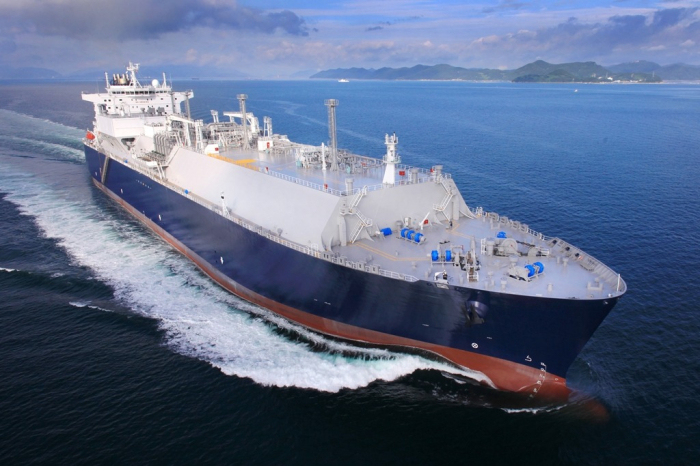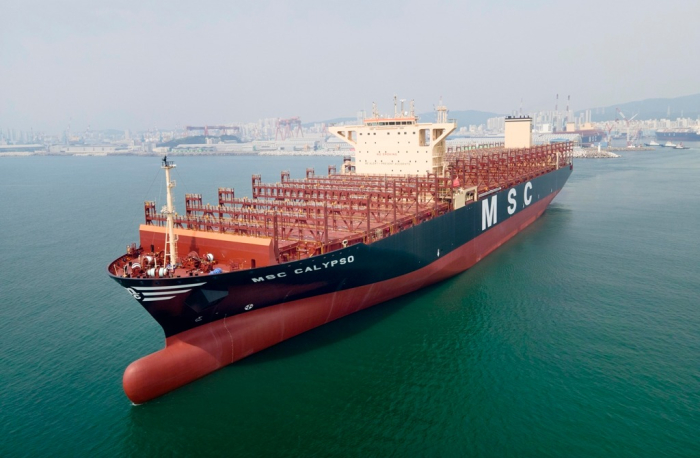Korean shipbuilders in talks for $3.3 bn Qatar LNG tanker deals
Korean shipbuilders aim to meet growing demand for container ships, especially those with LNG dual-fuel power systems
By Aug 05, 2024 (Gmt+09:00)
Samsung steps up AR race with advanced microdisplay for smart glasses


When in S. Korea, it’s a ritual: Foreigners make stops at CU, GS25, 7-Eleven


Maybe Happy Ending: A robot love story that rewrote Broadway playbook


NPS yet to schedule external manager selection; PE firms’ fundraising woes deepen


US auto parts tariffs take effect; Korea avoids heavy hit



South Korean shipbuilders are in talks with Qatari state companies for an estimated $3.3 billion in deals to manufacture additional liquefied natural gas (LNG) tankers as growing demand for the carriers along with container ships is expected to power overall vessel prices near record highs.
HD Korea Shipbuilding & Offshore Engineering Co. (HD KSOE), the parent of the world’s No. 2 shipyard HD Hyundai Heavy Industries Co., as well as Samsung Heavy Industries Co. and Hanwha Ocean Co. have been in talks with the state-owned QatarEnergy to supply 10 LNG carriers in total since June, industry sources in Seoul said on Monday.
The company, formerly Qatar Petroleum, reportedly wanted the three South Korean shipyards to build Q-Max LNG carriers with a capacity of 270,000 cubic meters, larger than the usual 174,000-cubic-meter vessels.
Q-MAX CARRIERS
The prices of the Q-Max tankers – "Q" stands for Qatar and "Max" for the maximum size ship that can dock at the country’s LNG terminals – are higher than standard carriers due to their larger capacity.
Hudong-Zhonghua Shipbuilding, a subsidiary of China State Shipbuilding Corp. (CSSC), agreed to sell 18 Q-Max carriers to QatarEnergy for a total of $6 billion, or $330 million per unit, earlier this year.
South Korean shipbuilders are likely to bag $3.3 billion contracts in total if QatarEnergy orders those carriers at similar prices to those contracted with the Chinese company, industry sources in Seoul said.
“We will decide whether or not to sign a deal after reviewing vessel prices and profitability,” said a Samsung Heavy source, adding the company has experience in manufacturing Q-Max tankers.
MORE LNG TANKER ORDERS
South Korean shipbuilders already won deals worth 13 trillion won ($9.5 billion) in total to build standard-size LNG tankers at the beginning of this year and late last year.
HD KSOE signed deals for 17 LNG carriers, while Samsung Heavy and Hanwha inked contracts for 15 vessels and 12 units, respectively.
The three leading South Korean shipyards are expected to bag more deals as demand for the vessels is likely to increase, industry sources said.
The global LNG industry needs 100 LNG carriers in addition to 185 tankers, which have been ordered so far, to serve the new liquefaction projects of 175 million tons already greenlighted and under construction worldwide, according to membrane-type cargo tank designer GTT.

RISING PRICES
Growing demand for LNG tankers is expected to further ramp up new prices overall, industry sources in Seoul said.
Clarksons Research said its newbuilding price index, a key gauge of the global shipbuilding sector, stood at 187.98 last month, nearing the all-time high of 191.6 recorded in September 2008.
The gain was led by container ships. The average price of new container ships of 22,000-24,000 twenty-foot equivalent units rose 20.9% to $272 million in July from a year earlier.
Container ship prices have been higher than those of LNG carriers since March as shipping companies increased orders given rising freight rates.
Smaller shipping companies have been rushing to order container ships for delivery after 2028 since the top five players already dominated shipyards.
South Korean shipbuilders, which had ignored container ship orders due to their lower profitability, have shifted their business strategies to meet demand.
“Shipping companies are getting more anxious,” said an industry source in Seoul. “Demand for container ships, especially those equipped with LNG dual-fuel power systems, is growing.”
(The estimated value of the deals to $3.3 billion from $6.6 billion and the number of LNG carriers to 10 from 20 to be ordered were corrected)
Write to Hyung-Kyu Kim at khk@hankyung.com
Jongwoo Cheon edited this article.
-
 Shipping & ShipbuildingHanwha Ocean wins $1.57 billion deal for LNG carriers, VLCCs
Shipping & ShipbuildingHanwha Ocean wins $1.57 billion deal for LNG carriers, VLCCsJul 01, 2024 (Gmt+09:00)
1 Min read -
 Shipping & ShipbuildingS.Korea’s HD KSOE bags $1.1 bn order to build LNG carriers
Shipping & ShipbuildingS.Korea’s HD KSOE bags $1.1 bn order to build LNG carriersFeb 26, 2024 (Gmt+09:00)
1 Min read -
 Shipping & ShipbuildingSamsung Heavy wins $3.45 bn order for 15 LNG carriers
Shipping & ShipbuildingSamsung Heavy wins $3.45 bn order for 15 LNG carriersFeb 07, 2024 (Gmt+09:00)
1 Min read -
 Shipping & ShipbuildingKorea’s Hanwha Ocean quits money-losing container shipbuilding business
Shipping & ShipbuildingKorea’s Hanwha Ocean quits money-losing container shipbuilding businessJan 08, 2024 (Gmt+09:00)
3 Min read -
 Shipping & ShipbuildingS.Korean HD Hyundai inks $3.9 bn Qatar LNG tanker deal
Shipping & ShipbuildingS.Korean HD Hyundai inks $3.9 bn Qatar LNG tanker dealOct 25, 2023 (Gmt+09:00)
4 Min read -
 Shipping & ShipbuildingS.Korea's shipbuilders near $9.4 bn in LNG carrier orders from Qatar
Shipping & ShipbuildingS.Korea's shipbuilders near $9.4 bn in LNG carrier orders from QatarJul 27, 2023 (Gmt+09:00)
2 Min read


